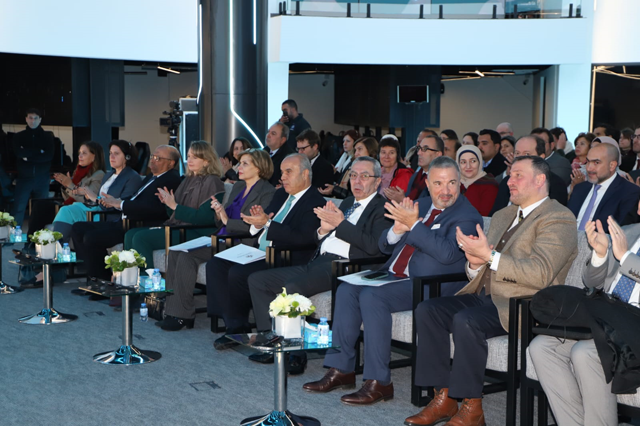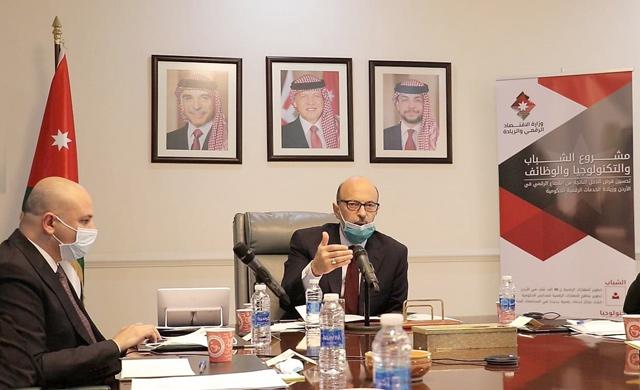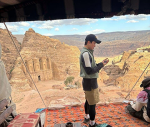You are here
Prime minister submits policy statement to Lower House
By JT - Dec 01,2024 - Last updated at Dec 01,2024

Prime Minister Jafar Hassan delivers the government's policy statement to the Lower House during a session headed by House Speaker Ahmad Safadi on Sunday (Petra photo)
•Hassan reaffirms government’s commitment to national consensus on political modernisation framework
•Premier says primary aim of political modernisation is to boost role of Lower House
•PM stresses vital role of Jordan Armed Forces-Arab Army, security agencies
•'Jordan will continue to support Palestine by every means possible to end occupation, lift injustice faced by its brotherly people'
AMMAN — Prime Minister Jafar Hassan presented the government's policy statement to the Lower House on Sunday during a session chaired by House Speaker Ahmad Safadi.
The statement, presented as part of the government's bid for a vote of confidence, outlined a comprehensive vision for the development and modernisation of the Kingdom, the Jordan News Agency, Petra, reported.
The prime minister reaffirmed the government’s commitment to national consensus on the political modernisation framework, which represents a central milestone in establishing a comprehensive and responsible Jordanian democratic model.
He added that the primary aim of political modernisation is to boost "the role of this constitutional institution in which we stand, fortify its structure, and enhance the role of its parties and members."
One of the key pillars of implementing the Constitution is the balanced sharing of responsibilities among authorities, based on the principle of separation of powers, he said.
The premier stressed that the government’s political approach is "rooted in sincere and candid dialogue" that recognises differences, avoids escalating disputes, and rejects superficial solutions to challenges, adding that this dialogue is inclusive, non-marginalising, accepting of others, and aims to build possible consensus within the framework of national programmes.
He also stressed the vital role of the Jordan Armed Forces-Arab Army (JAF) and security agencies, describing them as the first schools for instilling values of loyalty, selflessness, and courage, adding that their significant contribution to the nation’s development and its sectors throughout Jordan’s history is "unparalleled".
As directed by His Majesty King Abdullah, the Supreme Commander of JAF, the government’s support for the army and security agencies is "unwavering and remains a top priority, ensuring Jordan’s protection from regional volatility, senseless wars, and enemies of moderation, wisdom, and reason."
On Palestine, Hassan reiterated its status as Jordan’s central cause.
"Jordan will continue to support Palestine by every means possible to end the occupation, lift the injustice faced by its brotherly people, and fulfil their legitimate rights, foremost among them the right to freedom and the establishment of an independent, sovereign state on the June 4 1967 lines, with East Jerusalem as its capital," the prime minister stressed.
He underscored the Kingdom’s unrelenting efforts to end the Israeli aggression on Gaza and address the humanitarian catastrophe there, while confronting illegal Israeli measures in the occupied West Bank that undermine all prospects for a just and comprehensive peace.
The prime minister reiterated His Majesty’s clear stance: "Jordan will never be a substitute homeland for anyone. It is the homeland of Jordanians that will remain steadfast, proud, and strong with the resolve of its people and the wisdom of our Hashemite leadership."
"Jordan will remain the voice of truth and just peace, leveraging the solid international relations cultivated by King Abdullah to serve our national interests and Arab and Islamic causes. Jordan will rally global support for Palestinian rights, warn of the catastrophic consequences of the continued violation of these rights, and call for an end to the double standards in applying international law."
He stressed the rule of law as the tool to promote social justice, rejecting compromises or appeasement policies at the expense of the law and citizens' rights, safety, and well-being.
The prime minister added that the government’s programme is focused on steadfastly advancing comprehensive political, economic, and administrative modernisation, which is the state’s project for the future.
"There is no room for hesitation, delay, or recycling of plans and decisions; time is pressing," Hassan added.
On education, the prime minister emphasised that Jordan’s strength has always been rooted in education, and the future lies in equipping young people with skills and qualifications. "Our aim is to build an educational system that produces competencies, not merely certificates."
The premier highlighted ongoing development efforts in Amman, ensuring the capital remains a "vibrant beacon for Jordan, rich in heritage, diversity, and cultural legacy."
He pointed out that government’s programmes are fundamentally designed for youth, ensuring better opportunities for them to become stronger, more capable, and more efficient than the current generation, building a greater Jordan as the nation enters its second centennial.
"Many warned me against raising expectations too high, but I firmly believe that our ambitions must match the remarkable journey of this great country and the aspirations of its generous people. Jordan deserves the highest expectations, and this government is not here to manage expectations but to work tirelessly to unleash potential and realise ambitions," Hassan noted.
The prime minister added that the government has laid out its programmes with "utmost realism and responsibility," aiming to deliver tangible results and be held accountable.
"Our task will not be easy, but we will neither falter nor hesitate. We will work with all our power to ensure Jordan’s greatness remains perpetual."
He said that at the top of major schemes is the National Water Carrier, the third-largest water project in the region, where the government is proceeding with its implementation through plans to sign the financial closure agreement next year, paving the way for execution to begin before the end of the year.
The prime minister said that the project is expected to be completed within four years, aiming to supply 300 million cubic metres of desalinated water from Aqaba to enhance water security.
Hassan said that studies on green hydrogen and green ammonia production will be completed within the next two years, alongside the development of a roadmap for their use and production.
Current programmes include tenders for solar power projects with a capacity of 200 megawatts in 2026 and wind power projects with a capacity of 100 megawatts in 2027, Hassan pointed out, adding that these projects aim to increase renewable energy capacity to 3,000 megawatts by the end of 2027, accounting for 28 per cent of electricity generation.
The prime minister also said that government efforts aim to revitalise the tourism sector, capitalising on the opportunities it offers and increasing its contribution to GDP from the current 13.3 per cent to at least 15 per cent by 2029, the premier noted.
Hassan said that government efforts target welcoming 5.5 million tourists and achieving JD5.5 billion in tourism revenue.
In the ICT sector, the prime minister said that government initiatives build on achievements that have positioned Jordan and its talent as "leaders regionally and globally over the past two decades".
He added that the government aims to boost annual growth in this sector to 13 per cent, and increase its contribution to the GDP from 2.9 per cent to 4.7 per cent within five years.
In the entrepreneurship field, the government will support 250 start-ups over the next five years, the premier said.
Hassan said that more than 100 industrial companies will receive export support to boost their exports over the next two years, expand access to new markets, and enhance market share in traditional ones.
Recognising the importance of controlling public debt as a percentage of GDP, which currently stands at 90 per cent, the prime minister said that the government's goal is to reduce this figure to around 80 per cent by 2028.
Regarding the rising cost of external debt servicing in recent years, driven by global interest rate increases and reliance on commercial loans, the premier said that the government aims to replace high-cost debt with concessional loans.
To streamline and simplify procedures and complete transactions, the government is committed to automating 80 per cent of its services next year and achieving full automation by the end of 2026, he said.
Related Articles
AMMAN — Minister of Education Azmi Mahafzah on Monday launched the World Bank-funded "Jordan Pathway: Education, Skills and Administrative R
AMMAN — The government on Sunday launched "Youth, Technology and Jobs" project and officially released its first component titled "Jordan Gr
AMMAN — Prime Minister Bisher Khasawneh on Tuesday met King Carl XVI Gustaf and Queen Silvia of Sweden, in the presence of HRH Prince Ali an

















